Unit 5 Do you have a soccer ball? Section A (1a-2d) 课件+(嵌入音频)
文档属性
| 名称 | Unit 5 Do you have a soccer ball? Section A (1a-2d) 课件+(嵌入音频) | 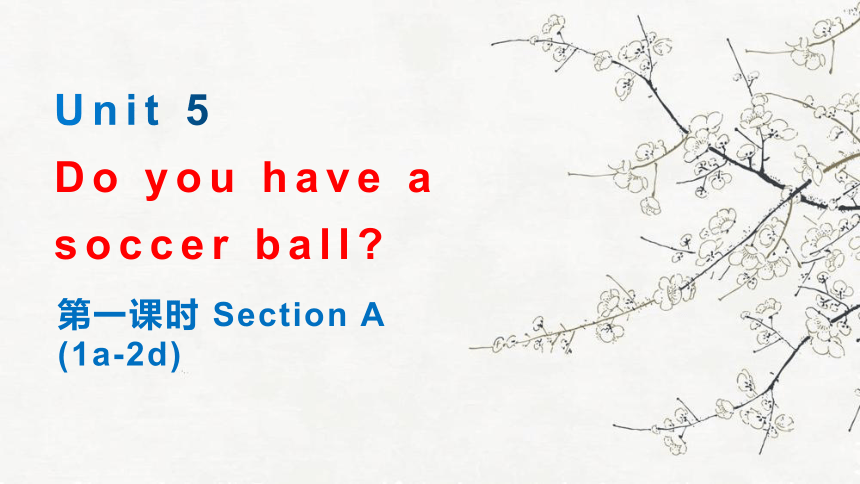 | |
| 格式 | pptx | ||
| 文件大小 | 12.7MB | ||
| 资源类型 | 试卷 | ||
| 版本资源 | 人教新目标(Go for it)版 | ||
| 科目 | 英语 | ||
| 更新时间 | 2022-10-18 10:49:59 | ||
图片预览

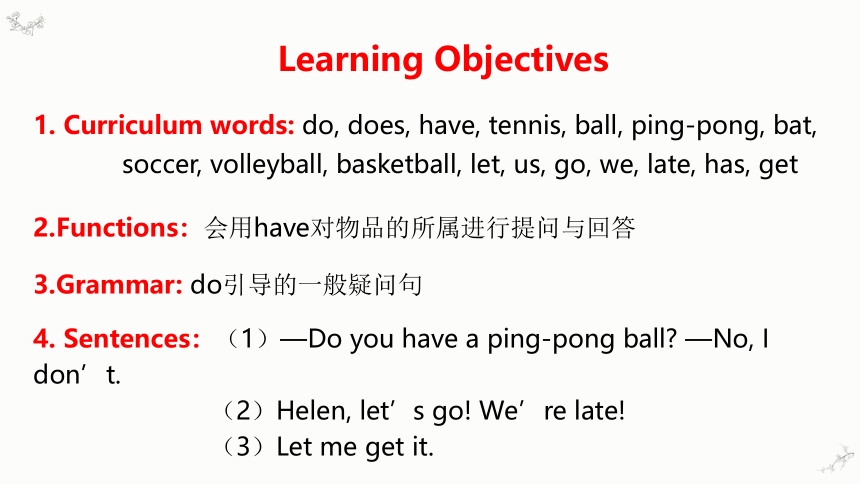

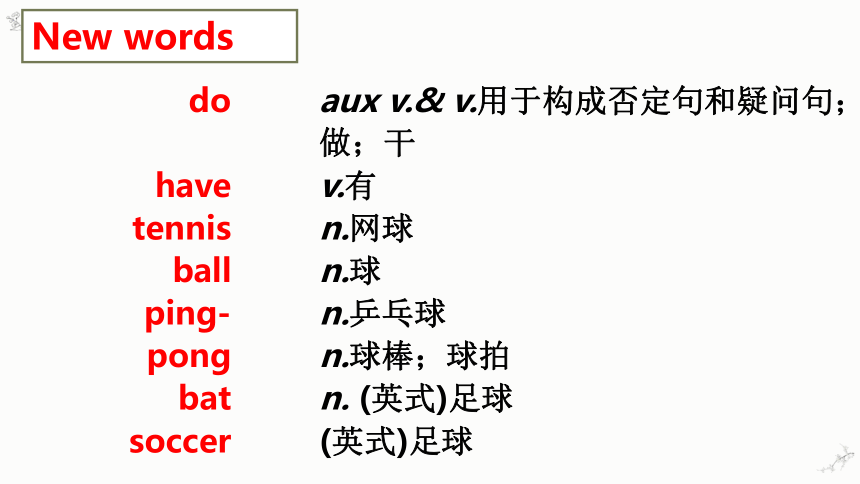
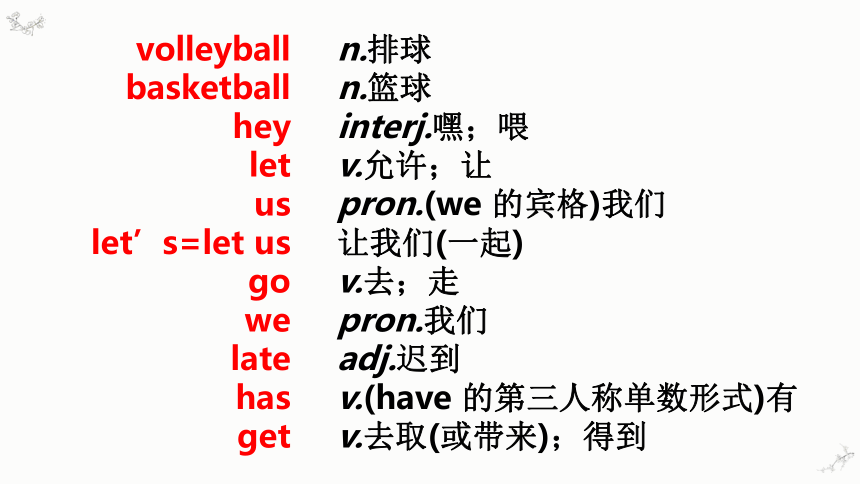
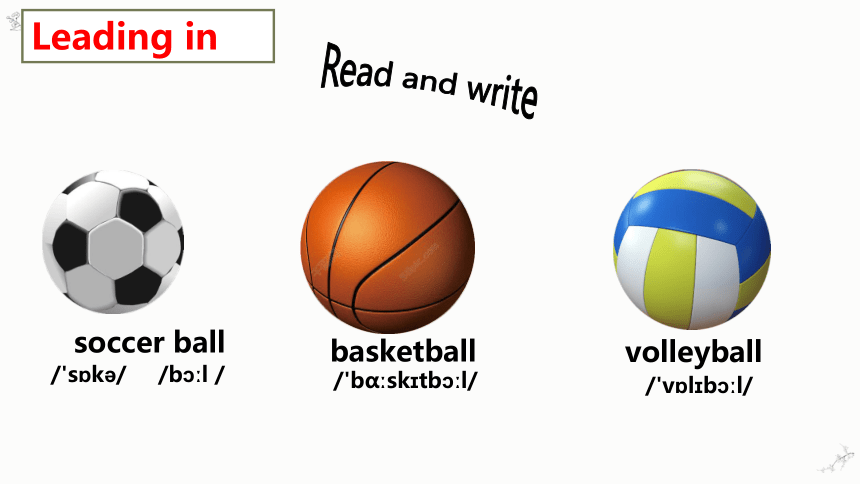
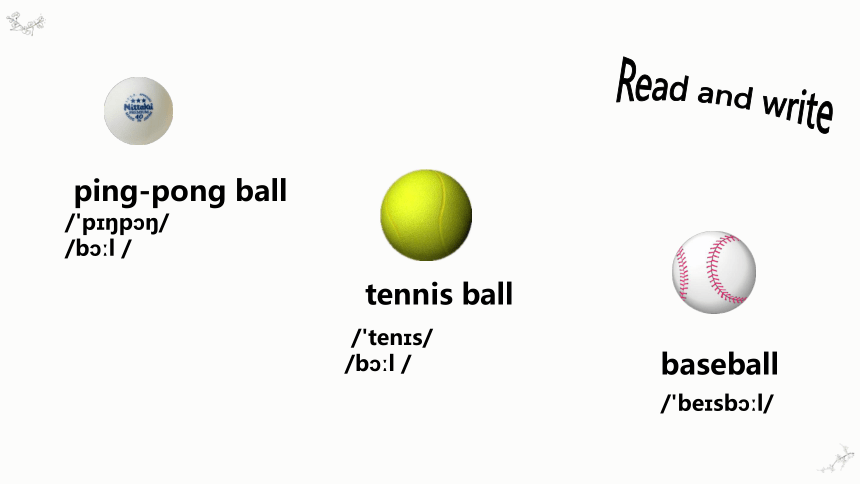
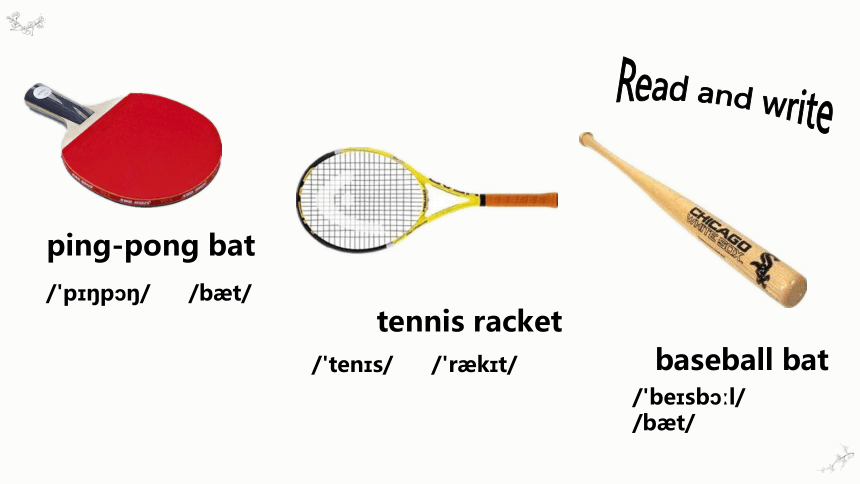
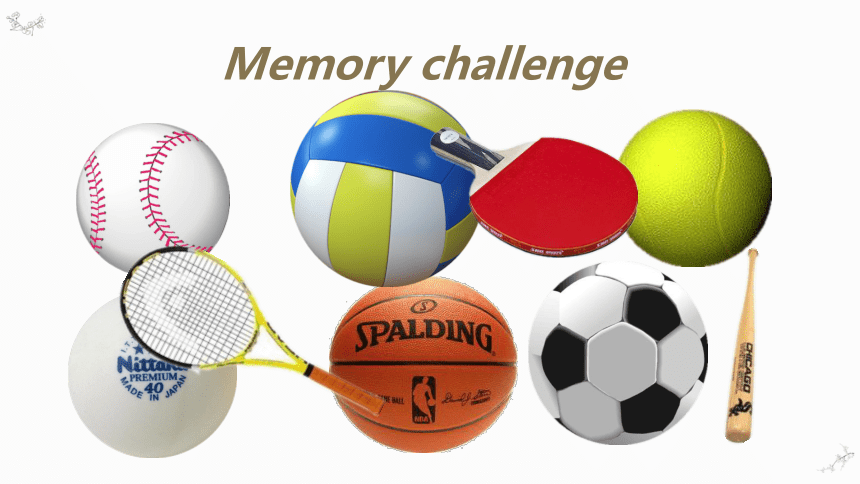
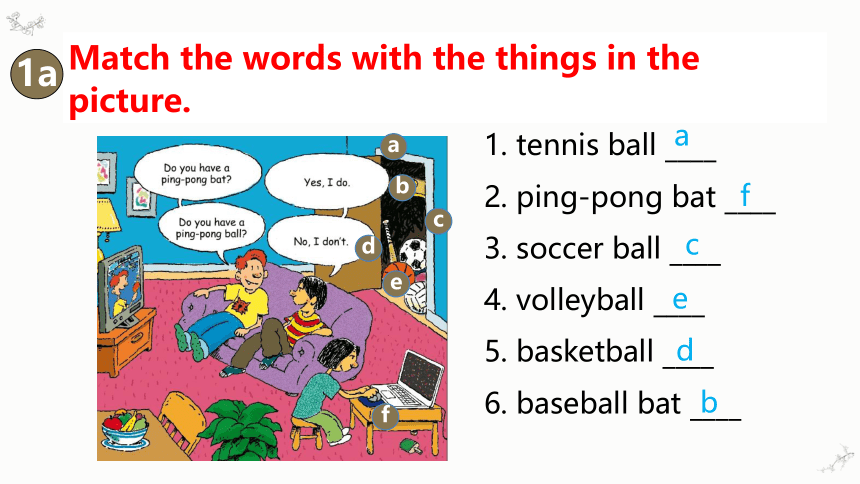
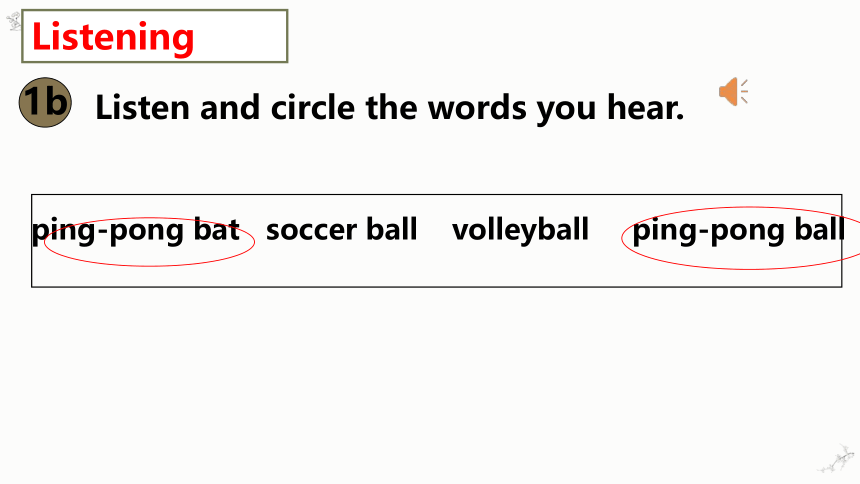
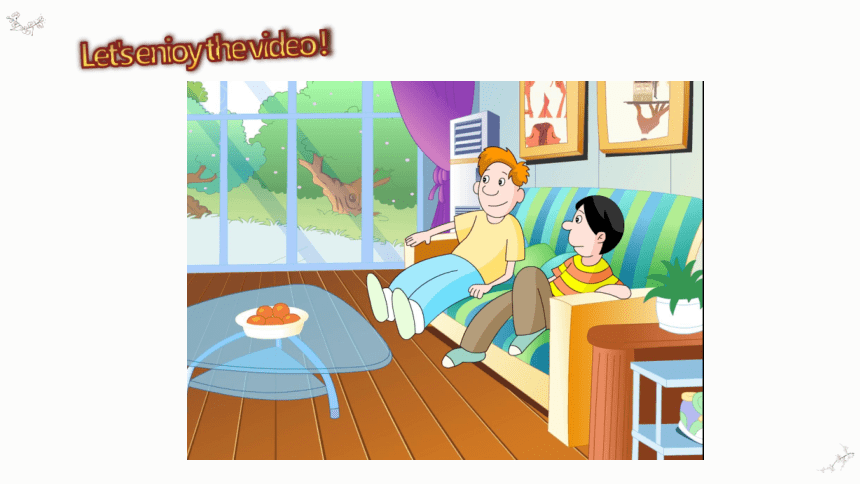
文档简介
(共31张PPT)
Unit 5
Do you have a soccer ball
第一课时 Section A (1a-2d)
Learning Objectives
1. Curriculum words: do, does, have, tennis, ball, ping-pong, bat,
soccer, volleyball, basketball, let, us, go, we, late, has, get
2.Functions:会用have对物品的所属进行提问与回答
3.Grammar: do引导的一般疑问句
4. Sentences:(1)—Do you have a ping-pong ball —No, I don’t.
(2)Helen, let’s go! We’re late!
(3)Let me get it.
Warm-up
Do you have a ...
Yes, I do.
No, I don’t.
do
have
tennis
ball
ping-pong
bat
soccer
aux v.& v.用于构成否定句和疑问句;做;干
v.有
n.网球
n.球
n.乒乓球
n.球棒;球拍
n. (英式)足球
(英式)足球
New words
volleyball
basketball
hey
let
us
let’s=let us
go
we
late
has
get
n.排球
n.篮球
interj.嘿;喂
v.允许;让
pron.(we 的宾格)我们
让我们(一起)
v.去;走
pron.我们
adj.迟到
v.(have 的第三人称单数形式)有
v.去取(或带来);得到
Read and write
basketball
/'bɑ sk tb l/
volleyball
/'v l b l/
soccer ball
/'s k / /b l /
Leading in
Read and write
ping-pong ball
/'p p / /b l /
tennis ball
baseball
/'be sb l/
/'ten s/ /b l /
Read and write
ping-pong bat
/'p p / /b t/
tennis racket
baseball bat
/'ten s/ /'r k t/
/'be sb l/ /b t/
Memory challenge
Match the words with the things in the picture.
1. tennis ball ____
2. ping-pong bat ____
3. soccer ball ____
4. volleyball ____
5. basketball ____
6. baseball bat ____
a
b
f
e
d
c
a
b
c
d
e
f
1a
1b
Listening
Listen and circle the words you hear.
ping-pong bat soccer ball volleyball ping-pong ball
Let's enioy the video !
Practice the conversation with your partner. Then ask and answer questions about the things in the picture.
A: Do you have a ping-pong bat
B: Yes, I do.
A: Do you have a ping-pong ball
B: No, I don’t.
1c
Pair work
1
3
4
2
Listen to the conversations and number the pictures [1-4].
2a
Listening
2b
Listen again. Match the pictures in 2a with the balls.
1
3
2
4
Conversation 2
John: Hi, Mike.
Mike: Hi, John.
John: I want to play basketball. Do you have a basketball
Mike: Yes, I do.
John: Great!
Conversation 1
Bob: Do you have a soccer ball, Paul
Paul: No, I don't.
Bob: Does your brother Alan have one
Paul: Yes, he does.
Read the conversation after the tape.
Conversation 4
Frank: Do you have a volleyball, Dale
Dale: No, I don't. But my brother does. Let's go and find him.
Conversation 3
Jane: Hi, Sally.
Sally: Hi, Jane.
Jane: Sally, this is my friend, Anna.
Sally: Hi, Anna. Nice to meet you.
Anna: Nice to meet you, Sally.
Sally: Let's play tennis. Do you have a tennis ball, Jane
Jane: Sorry, I don't.
2c
Ask and answer questions about the people in 2a.
No, she
doesn’t.
Does Jane have a tennis ball
Practice
Listen and write down the things they are talking about.
baseball
bag
baseball bat
jacket
hat
2d
Cindy: Hey, Helen, let's go! We’re late!
Helen: OK.
Cindy: Do you have the baseball
Helen: Yes, I do. It’s in my bag.
Cindy: And where’s our baseball bat
Helen: Bill has it.
Cindy: Oh, yeah. And do you have your jacket
Helen: Oh, no, I don’t. It’s on the chair. Let me get it.
Cindy: And your hat, too!
Helen: OK, I have my jacket and hat. Let’s go!
让我去拿它。
Role-play the conversation.
Language points
1.Do you have a ping-pong bat
本句含行为动词have的一般现在时的一般疑问句,其构成为:
Do/ Does + 主语+ have + 宾语?
do作助动词,无实际意义,用于构成行为动词的疑问句或否定句。第三人称单数形式为does。
e.g. Does he go to school
他去上学吗?
have作及物动词,意为“有”,其第三人称单数形式是has。
e.g. I have a new red car.
我有一辆新的红色小汽车。
She has two rulers.
她有两把尺子。
2. Hey, Helen, let’s go!
let v. 允许;让,作动词,常用结构 let sb. do sth.意为“让某人做某事”。其中sb.要用人称代词的宾格形式,do要用动词原形。
e.g.Let me help you.
让我帮你吧。
对于此祈使句所表示的建议作肯定回答时,一般用OK./ All right./ Good idea./Yes, let’s... 等; 否定回答一般用Sorry, I... 等。
e.g.—Let’s go to the park! 咱们去公园吧!
—Good idea. 好主意。
let’s 包括对方在内 Let’s do sports. 咱们做运动吧。
let us 不包括对方在内 Let us know your telephone number.
让我们知道你的电话号码。
us是人称代词we的宾格形式,一般放在谓语动词或介词后面作宾语。
注意区分
go 为不及物动词,意为“去;走”,其第三人称单数形式是goes,对应词是come“来”。表示“去某地”,用“go to+ 地点名词”;当地点是home, there 等副词时,省略to。
e.g. Let’s go to school !
咱们去上学吧!
Jack goes there with his father.
杰克和他父亲去那里。
3.Let me get it.
get作及物动词,在此处意为“去取(或带来)”,还可意为“得到”,后接名词或代词作宾语。
e.g. Please go and get a shared bike.
请去取辆共享单车来。
一、单项选择
1. —Do you have lunch at home
—_______
A. Yes, I am. B. Yes, I can. C. Yes, I do. D. Yes, I have.
2.—Let’s watch TV after dinner.
—_______
A. Thank you! B. Sorry, I’m not.
C. I don’t know. D. OK.
Exercises
D
C
3. —_______ your sister have a tennis racket
—No, she _______.
A. Do; don’t B. Do; doesn’t
C. Does; doesn’t D. Does; don’t
4. I a ping-pong ball and Bob two ping-pong bats.
A. have; have B. have; has C. has; has D. has; have
5. My soccer ball under the bed. Let get it.
A. are; we B. are; me C. is; we D. is; me
B
C
D
二、根据首字母提示或汉语意思完成句子
1. Tom has three ___________ (篮球).
2. I want to buy a ___________ (排球).
3. Let’s ___________ (go) to school.
4. Hurry up ! We’re l__________ for class.
5. My jacket is on the chair. Let me g it.
basketballs
volleyball
go
ate
et
Summary
How to ask and answer?
Do you have...
Yes,I do.
No,I don’t.
Homework
Read the conversation in 2d.
Recite the new words .
Unit 5
Do you have a soccer ball
第一课时 Section A (1a-2d)
Learning Objectives
1. Curriculum words: do, does, have, tennis, ball, ping-pong, bat,
soccer, volleyball, basketball, let, us, go, we, late, has, get
2.Functions:会用have对物品的所属进行提问与回答
3.Grammar: do引导的一般疑问句
4. Sentences:(1)—Do you have a ping-pong ball —No, I don’t.
(2)Helen, let’s go! We’re late!
(3)Let me get it.
Warm-up
Do you have a ...
Yes, I do.
No, I don’t.
do
have
tennis
ball
ping-pong
bat
soccer
aux v.& v.用于构成否定句和疑问句;做;干
v.有
n.网球
n.球
n.乒乓球
n.球棒;球拍
n. (英式)足球
(英式)足球
New words
volleyball
basketball
hey
let
us
let’s=let us
go
we
late
has
get
n.排球
n.篮球
interj.嘿;喂
v.允许;让
pron.(we 的宾格)我们
让我们(一起)
v.去;走
pron.我们
adj.迟到
v.(have 的第三人称单数形式)有
v.去取(或带来);得到
Read and write
basketball
/'bɑ sk tb l/
volleyball
/'v l b l/
soccer ball
/'s k / /b l /
Leading in
Read and write
ping-pong ball
/'p p / /b l /
tennis ball
baseball
/'be sb l/
/'ten s/ /b l /
Read and write
ping-pong bat
/'p p / /b t/
tennis racket
baseball bat
/'ten s/ /'r k t/
/'be sb l/ /b t/
Memory challenge
Match the words with the things in the picture.
1. tennis ball ____
2. ping-pong bat ____
3. soccer ball ____
4. volleyball ____
5. basketball ____
6. baseball bat ____
a
b
f
e
d
c
a
b
c
d
e
f
1a
1b
Listening
Listen and circle the words you hear.
ping-pong bat soccer ball volleyball ping-pong ball
Let's enioy the video !
Practice the conversation with your partner. Then ask and answer questions about the things in the picture.
A: Do you have a ping-pong bat
B: Yes, I do.
A: Do you have a ping-pong ball
B: No, I don’t.
1c
Pair work
1
3
4
2
Listen to the conversations and number the pictures [1-4].
2a
Listening
2b
Listen again. Match the pictures in 2a with the balls.
1
3
2
4
Conversation 2
John: Hi, Mike.
Mike: Hi, John.
John: I want to play basketball. Do you have a basketball
Mike: Yes, I do.
John: Great!
Conversation 1
Bob: Do you have a soccer ball, Paul
Paul: No, I don't.
Bob: Does your brother Alan have one
Paul: Yes, he does.
Read the conversation after the tape.
Conversation 4
Frank: Do you have a volleyball, Dale
Dale: No, I don't. But my brother does. Let's go and find him.
Conversation 3
Jane: Hi, Sally.
Sally: Hi, Jane.
Jane: Sally, this is my friend, Anna.
Sally: Hi, Anna. Nice to meet you.
Anna: Nice to meet you, Sally.
Sally: Let's play tennis. Do you have a tennis ball, Jane
Jane: Sorry, I don't.
2c
Ask and answer questions about the people in 2a.
No, she
doesn’t.
Does Jane have a tennis ball
Practice
Listen and write down the things they are talking about.
baseball
bag
baseball bat
jacket
hat
2d
Cindy: Hey, Helen, let's go! We’re late!
Helen: OK.
Cindy: Do you have the baseball
Helen: Yes, I do. It’s in my bag.
Cindy: And where’s our baseball bat
Helen: Bill has it.
Cindy: Oh, yeah. And do you have your jacket
Helen: Oh, no, I don’t. It’s on the chair. Let me get it.
Cindy: And your hat, too!
Helen: OK, I have my jacket and hat. Let’s go!
让我去拿它。
Role-play the conversation.
Language points
1.Do you have a ping-pong bat
本句含行为动词have的一般现在时的一般疑问句,其构成为:
Do/ Does + 主语+ have + 宾语?
do作助动词,无实际意义,用于构成行为动词的疑问句或否定句。第三人称单数形式为does。
e.g. Does he go to school
他去上学吗?
have作及物动词,意为“有”,其第三人称单数形式是has。
e.g. I have a new red car.
我有一辆新的红色小汽车。
She has two rulers.
她有两把尺子。
2. Hey, Helen, let’s go!
let v. 允许;让,作动词,常用结构 let sb. do sth.意为“让某人做某事”。其中sb.要用人称代词的宾格形式,do要用动词原形。
e.g.Let me help you.
让我帮你吧。
对于此祈使句所表示的建议作肯定回答时,一般用OK./ All right./ Good idea./Yes, let’s... 等; 否定回答一般用Sorry, I... 等。
e.g.—Let’s go to the park! 咱们去公园吧!
—Good idea. 好主意。
let’s 包括对方在内 Let’s do sports. 咱们做运动吧。
let us 不包括对方在内 Let us know your telephone number.
让我们知道你的电话号码。
us是人称代词we的宾格形式,一般放在谓语动词或介词后面作宾语。
注意区分
go 为不及物动词,意为“去;走”,其第三人称单数形式是goes,对应词是come“来”。表示“去某地”,用“go to+ 地点名词”;当地点是home, there 等副词时,省略to。
e.g. Let’s go to school !
咱们去上学吧!
Jack goes there with his father.
杰克和他父亲去那里。
3.Let me get it.
get作及物动词,在此处意为“去取(或带来)”,还可意为“得到”,后接名词或代词作宾语。
e.g. Please go and get a shared bike.
请去取辆共享单车来。
一、单项选择
1. —Do you have lunch at home
—_______
A. Yes, I am. B. Yes, I can. C. Yes, I do. D. Yes, I have.
2.—Let’s watch TV after dinner.
—_______
A. Thank you! B. Sorry, I’m not.
C. I don’t know. D. OK.
Exercises
D
C
3. —_______ your sister have a tennis racket
—No, she _______.
A. Do; don’t B. Do; doesn’t
C. Does; doesn’t D. Does; don’t
4. I a ping-pong ball and Bob two ping-pong bats.
A. have; have B. have; has C. has; has D. has; have
5. My soccer ball under the bed. Let get it.
A. are; we B. are; me C. is; we D. is; me
B
C
D
二、根据首字母提示或汉语意思完成句子
1. Tom has three ___________ (篮球).
2. I want to buy a ___________ (排球).
3. Let’s ___________ (go) to school.
4. Hurry up ! We’re l__________ for class.
5. My jacket is on the chair. Let me g it.
basketballs
volleyball
go
ate
et
Summary
How to ask and answer?
Do you have...
Yes,I do.
No,I don’t.
Homework
Read the conversation in 2d.
Recite the new words .
同课章节目录
- starters 预备篇(2012秋审查)
- Unit 1 Good morning !
- Unit 2 What’s this in English?
- Unit 3 What color is it ?
- Unit 1 My name's Gina.
- Section A
- Section B
- Unit 2 This is my sister.
- Section A
- Section B
- Unit 3 Is this your pencil?
- Section A
- Section B
- Unit 4 Where's my schoolbag?
- Section A
- Section B
- Unit 5 Do you have a soccer ball?
- Section A
- Section B
- Unit 6 Do you like bananas?
- Section A
- Section B
- Unit 7 How much are these socks?
- Section A
- Section B
- Unit 8 When is your birthday?
- Section A
- Section B
- Unit 9 My favorite subject is science.
- Section A
- Section B
